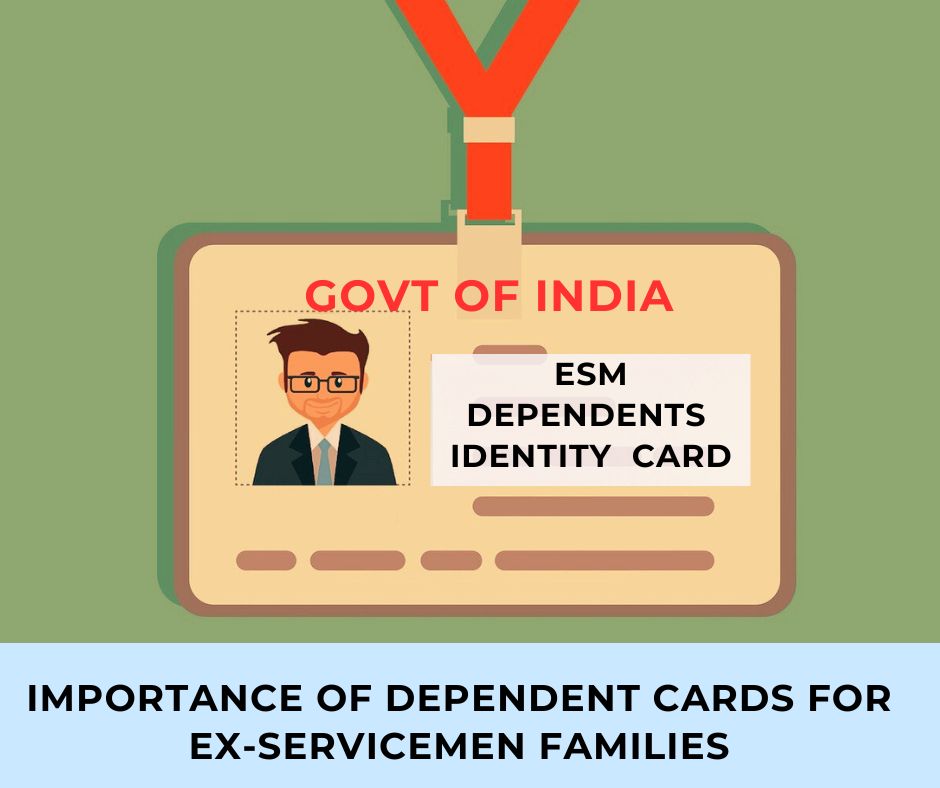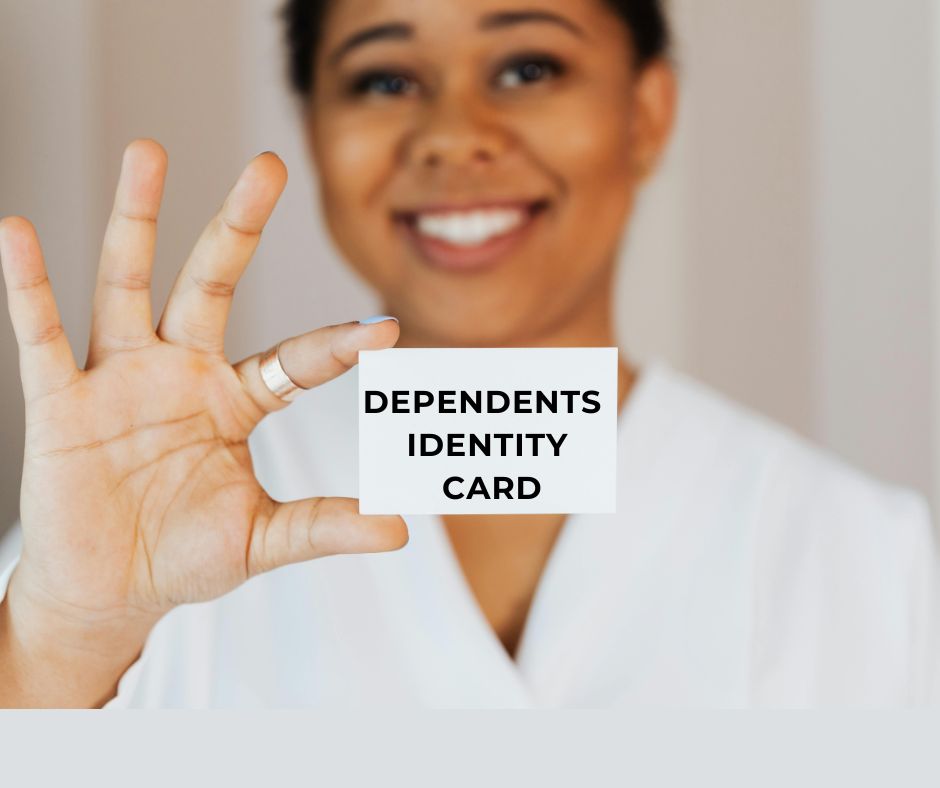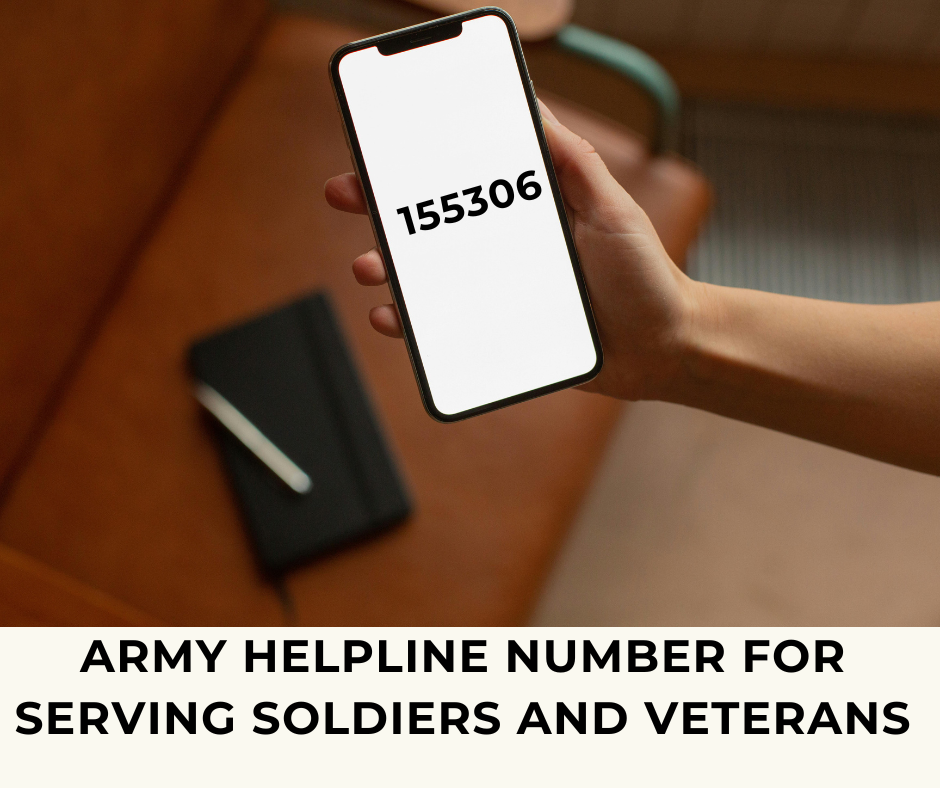
Introduction to Dependent Identity Cards
Identity cards are essential documents provided to retiring Armed Forces personnel by the relevant Zila Sainik Board (ZSB) or Zila Sainik Welfare Office (ZSWO), based on the location where they intend to settle after retirement. These cards serve as an official acknowledgment of their status as Ex-Servicemen (ESM) and are necessary for accessing various welfare benefits and schemes under the Armed Forces Flag Day Fund.
Details on Issuance and Importance
To obtain an ESM Identity Card, retiring personnel must visit their designated ZSB/ZSWO for registration. Their particulars are thoroughly verified, and if eligible for ESM status, they are required to fill out an application form. Once the form is completed, the Identity Card is issued. This card is a prerequisite for availing benefits under welfare schemes established by the Ministry of Defence, as per Government of India SRO 7E dated 13 April 1993.
Families of Ex-Servicemen (ESM) must possess Dependent Identity Cards, as these are essential for accessing defence establishments and facilities such as medical services and canteens. Unlike ECHS or CSD cards, which have specific purposes, Dependent Identity Cards are universally recognized within defence areas, including entry at security gates. While some may assume that ECHS or CSD cards suffice, the Dependent Card plays a crucial role in ensuring unrestricted access and entitlement to benefits, making it indispensable for the family’s well-being after the retirement of their parent or spouse.
Why Dependent Cards Are Necessary
Dependent Identity Cards are essential for the families of Ex-Servicemen (ESM), particularly for gaining entry into defence areas. Neither the ECHS card nor the CSD card is universally accepted, especially at defence area gates, making the Dependent Card indispensable. This card serves as both an identification document and proof of belonging to an ESM family, ensuring smooth access to defence establishments and services.
Eligibility and Application Process
Dependent Identity Cards are issued to individuals listed in the Ex-Serviceman’s (ESM) discharge book. Eligible dependents include the ESM’s spouse, unmarried and economically dependent children, and dependent parents. These criteria ensure that only genuine dependents of the ESM receive the card, enabling them to access necessary services and facilities.
Importance of the Dependent Identity Card
The Dependent Identity Card is a vital document for families of ex-servicemen, serving multiple essential purposes:
- Entry and Identity Verification: This card is mandatory for accessing defence establishments. Security personnel at gates require it for identification and ensuring that only authorized individuals gain entry.
- Access to Services: It facilitates access to medical facilities, canteen services, and other benefits within defence areas. Without it, dependents may face challenges availing these essential services.
- Health Services: While the ECHS card covers medical treatment, the Dependent Identity Card ensures identification and entry into defence hospitals and clinics. Both cards together provide comprehensive healthcare access.
- Defence Canteens: The card is necessary for shopping at defence canteens, validating the dependent’s identity and entitlement while preventing misuse.
- Educational Institutions: Dependents may require the card to enter specific educational institutions for defence personnel’s families and to claim scholarships or other educational benefits.
- Traveling: Certain travel concessions and services are also available upon presenting the Dependent Identity Card.

Issuing Guidelines for Dependent Identity Cards
Eligibility for the Dependent Identity Card is determined based on the details provided in the ex-serviceman’s (ESM) discharge book. The Zila Sainik Board (ZSB), where the ESM is registered, verifies these details to confirm eligibility. Dependents eligible for the card include:
- Spouses and economically dependent children of ESM pensioners.
- Dependent parents of soldiers killed in action, war widows, ESM widows, and their dependent children.
- Dependents with a monthly income not exceeding ₹3,500, calculated based on basic pension and dearness relief.
- Children, stepchildren, and legally adopted children of the ESM, up to the age of 25 or until their dependency ends, whichever occurs first.
The ZSB ensures the issuance of cards to all eligible dependents while adhering to these guidelines, thereby enabling them to access various benefits and services.
Application Process for Dependent Identity Cards
Steps to Apply:
- Visit your local Zila Sainik Board (ZSB) or Sainik Welfare Office (ZSWO).
- Complete the application form and attach all necessary documents.
- Submit the form along with the required documents for verification.
- Upon successful verification, the Dependent Identity Card will be issued.
Required Documents:
- A copy of the ESM’s discharge book.
- A passport-sized photograph of the dependent.
- Identity proof (e.g., Aadhaar card, PAN card).
- Address proof (e.g., discharge book, UID).
Issuance Guidelines:
The Department of Sainik Welfare/Zila Sainik Welfare adheres to the following while issuing Dependent Identity Cards:
- Cards are issued to all eligible ESM dependents.
- A fee of ₹100 per card is charged, payable to the Armed Forces Flag Day Fund via a Demand Draft addressed to the Kendriya Sainik Board.
- Each dependent must submit a separate application.
- The dependent card is linked to the ESM’s Identity Card to ensure authenticity.
- Applicants are informed about the importance of safeguarding the card and the consequences of its loss.
Validity of Dependent Identity Cards:
The validity of Dependent Identity Cards varies based on the relationship to the ESM and specific conditions:
- For War Widows or Pensioners’ Widows: The card is valid for a lifetime unless remarriage occurs.
- For the ESM’s Spouse: The card is valid for a lifetime unless there is a status change, such as divorce.
- For Children of ESM:
- Sons: Valid until 25 years of age or until they are no longer dependent, whichever comes first.
- Daughters: Valid until marriage.
- The card is issued initially for five years and can be renewed for another five years, subject to continued eligibility.
This structured validity ensures that dependents have access to the necessary benefits while maintaining updated records over time.
What to Do If the Dependent Identity Card Is Lost
Procedure for Obtaining a Duplicate Card:
- File an FIR at the nearest police station immediately after the card is lost.
- After one month, obtain a status verification certificate from the police station.
- Submit the FIR copy along with an application explaining the reasons for the loss to the ZSWO.
Important Notes:
- A duplicate card will not be issued after the third loss.
- Penalties for card loss are as follows:
- First Loss: ₹300.
- Second Loss: ₹600.
- Third Loss: ₹900.
The ESM or widow must pledge to return the duplicate card to the issuing authority if the lost card is recovered. The loss details (first/second/third) will be marked in red ink in the discharge book and registers.
Replacement Due to Wear and Tear
If the Dependent Identity Card becomes worn out or damaged:
- Submit the old card along with an application for a new laminated card.
- The issuing authority will confirm the facts and genuineness of the request.
- A fee of ₹100 will be charged for the new card.
Cancellation of Dependent Identity Cards
Dependent Identity Cards must be cancelled and returned to the issuing authority in the following situations:
- During renewal due to wear and tear.
- Upon the holder’s death.
- When the holder becomes ineligible, such as:
- Widows/daughters remarry.
- Sons reach 25 years of age or dependency ends.
These guidelines ensure proper issuance, renewal, and maintenance of Dependent Identity Cards while safeguarding against misuse.
Conclusion
The Dependent Identity Card is an essential document for families of Ex-Servicemen (ESM), providing access to crucial benefits and services. It ensures smooth entry into defence establishments, access to medical care, canteen services, educational benefits, and other welfare schemes. Without this card, ESM families would face difficulties in accessing the services and entitlements they deserve.
The issuance process, eligibility criteria, and necessary documentation ensure that only legitimate dependents are provided with the card, maintaining fairness and transparency. It is crucial for all eligible dependents to apply for the card and adhere to the guidelines for renewal and safeguarding the card. By doing so, ESM families can continue to enjoy the benefits and security they are entitled to after the service of their loved ones.
ALSO READ I What is the SPARSH PPO number? What do its 12 digits represent?






Can i get dependent I card application form online or by other sources, to get printouts and duly filled up at home before going to ZSB surat, as in surat city ZSB is very far and only for getting application form going 15-20 km in full traffic at a age of 70 is not advisable. Spouce presence at ZSB is necessary while submitting application by me(ESM)?
My 2nd querie fee of ₹100 to be paid by Demand draft is not adequate as on today’s lot of digital platforms available to pay. You know for making draft is how much painful. So send me other option to pay fees of ₹100/-
As I got my 2nd child after Retirement, his name not added in my discharge book. so how can I register his name. Is it advisable to register his name as dependent as he has all ready completed 40 years of age.
My Discharge book is very old of 1982 of Airforce. It dont have any serial No. Now a days I have seen in so many forms /application they need S.No. of discharge book. Can I make it new as per latest norms?
As I am medically boarded out in 1982 after 5 year 4 month service, but not in reciept of any pension, so I don’t have PPO No. Without PPO No. I am getting problems to apply for any ESM welfare schemes. Please guide me a good solution/option for this or how to get a PPO No. or pension?
My third queries, How can I know that my name (ESM) is registered in ZSB? Will they provide any registration No. Or any letters/certificate or mail to me, how can I check or confirm my registration completed?
Thanks
Dear Sir
Please visit your Zila Sainik Welfare Office with your Discharge Certificate/Book for the reply of your all queries and further necessary action.
With regards
Nopa Ram, Veteran
Rajasthan